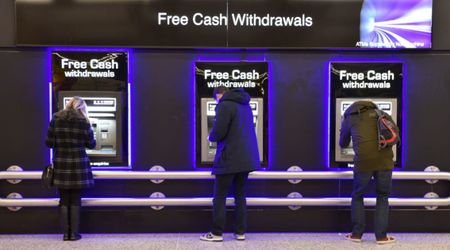Delayed Payments by Americans Have Triggered the First Dip in Credit Scores in a Decade

Credit card adoption has swayed people away from cash as they offer the convenience of purchasing apparel, electronics, and almost anything online, with the freedom to pay later. But this comfort can also backfire as missed card payments can rapidly snowball into a massive pile of debt. Americans are increasingly struggling with huge credit card bills since they earn less and run out of cash after paying rent and clearing bills, after which they turn to credit cards for shopping but do not have any plan of action to clear the dues.
The average credit card interest rate in 2023 is 20.68%! 🤯😱
— Anthony Doty (@Phatryda) August 8, 2023
Credit card debt is one of the leading debts in America. 🫣
These high-interest low payment traps are so easy to say yes to, but the years of paying on a balance keep you tied down! 😡
Credit cards can have some… pic.twitter.com/Nad1ScjpGD
Credit score dips, resulting in rising debt
As per the latest report released by the Federal Reserve Bank of New York, the credit card debt in America hiked up to $45 billion in the first quarter of 2023. This huge hike of 4.6% in just three months is shocking and concerning. These increases have pushed Americans into a debt of more than a trillion dollars amidst their challenge of saving money. Furthermore, FICO, the company making credit scores, revealed that the national average credit score dropped for the first time in a decade slightly from 718 to 717 in early 2023. The average score fell to its lowest i.e. 686 ten years ago when the nation faced a housing crisis and many Americans lost their homes. It never dipped after that, even during the pandemic, since the government provided safety nets to people suffering a financial crunch.
The primary reason behind credit score decline is the payment defaults which are attributed to the higher living cost. Americans are not able to pay off their credit card debt and credit card usage has now increased from 30% to 35%. Another catch is that almost 18% of the borrowers have missed their credit card bill payment for more than 30 days, due to which the score fell and debt increased. Another reason for this dip can be the savings depletion which has almost gone down to zero. During the COVID-19 times, the government extended their financial support to people which helped them pay off their debts, but now all the money has vanished. Now people have to earn, pay their rent, expenses, and most importantly their debts to live a stress-free life. Ethan Dornhelm, FICO’s vice president commented on the extremity of the situation and said, “We are pretty far removed from pandemic-level mitigation programs, so consumers are very much confronted with making good on their credit obligations with little in the way of stimulus checks or government defined accommodation programs."
Understanding the need for a strong credit score
People who regularly track their finances are aware of the importance of a good credit score. If your score is below the average limit, there are high chances of your loan application getting rejected or even if it's approved, you have to pay higher interest rates. Ann Kaplan, the founder of iFinance commented, “It’s difficult in this current economy not to have a good credit score." The average credit card charges go over 20% and in case you have a bad credit score, you will end up paying more.
Anything above 670 is considered a good score, 740 is very good and if the score is above 800, it is an exceptional one. FICO states that lenders consider your creditworthiness as “good” if you are maintaining an average credit score of 717 and you will get loans at lower interest rates. Kaplan further recommended, "Some of the best ways to improve your credit score come down to paying your bills on time every month and keeping your utilization rate, or the ratio of debt to total credit below 30% to limit the effect that high balances can have".
























